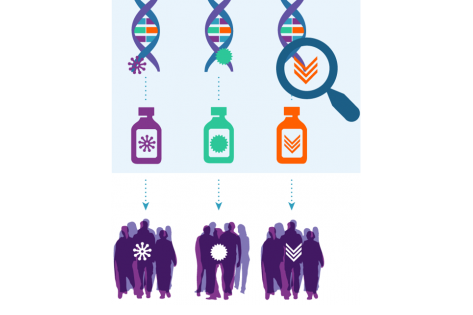
It’s a MATCH: Peter O’Dwyer on the Future of Precision Oncology
October 19, 2023
Now Enrolling: EA8211/SOAR for Patients with Advanced Kidney Cancer
October 19, 2023Now Enrolling: EA2212 for Patients with Gastric and/or Gastroesophageal Junction Cancer

EA2212 – A Randomized Phase II Study of Perioperative Atezolizumab +/- Chemotherapy in Resectable MSI-H/dMMR Gastric and Gastroesophageal Junction (GEJ) Cancer
The study chair for this trial is Lakshmi N. Rajdev, MD, MS (Mount Sinai Health System/The Tisch Cancer Institute) and the study co-chair is Nataliya V. Uboha, MD, PhD (University of Wisconsin/Carbone Cancer Center).
To date, surgery is the only curative approach for gastric and gastroesophageal junction (GEJ) cancers that have not spread. These cancers form at the top of the stomach or the beginning of the esophagus. About one-quarter of the cases of resected gastric and GEJ cancer have microsatellite instability (MSI), a form of genomic instability resulting from a deficient DNA mismatch repair system (dMMR). MSI at high frequency (MSI‐H) is known to drive cancer growth, yet recent analyses show that patients with this genomic alteration often have a better prognosis compared with those who do not. This may be related to ongoing immune surveillance of cancer: MSI-H/dMMR gastric/GEJ tumors contain high levels of tumor-infiltrating T-cells—a hallmark of immune surveillance that signals better outcomes. This may help explain why some patients benefit from immune checkpoint inhibitors, a type of immunotherapy.
Currently, the most common treatment approach for patients with operable MSI-H/dMMR gastric/GEJ cancer is perioperative immunotherapy (IO) followed by surgery and then adjuvant IO. In these patients, IO leads to higher pathologic complete response rates and more durable outcomes than chemotherapy. However, about one-third of patients do not see impressive results with this approach.
The EA2212 study is designed to establish whether combining chemotherapy and immunotherapy is superior to immunotherapy alone for patients with operable MSI-H/dMMR gastric/GEJ cancer. Patients will be randomized into one of two groups. The first group will receive chemotherapy and atezolizumab, an immune checkpoint inhibitor, for three to four cycles, followed by surgery. After surgery, they will again have chemotherapy and atezolizumab for three to four cycles, followed by atezolizumab alone for six cycles. The second group of patients will have atezolizumab alone for three cycles, followed by surgery, and then atezolizumab alone for another nine cycles.
The study’s primary objective is to compare three-year event-free survival (EFS) between the two groups. Secondary objectives are to assess tumor regression grade (TRG) rates, overall survival (OS) rates, and toxicity between the two groups, as well as to correlate circulating tumor DNA clearance with TRG, EFS, and OS.
To be eligible for this study, patients must have a histologically or cytologically confirmed diagnosis of gastric or GEJ adenocarcinoma that is MSI-H/dMMR. The cancer must be localized (without evidence of metastatic disease) and able to be removed by surgery. Patients must not have received any prior treatment for the cancer.
Learn more about EA2212 at ecog-acrin.org.
![ECOG-ACRIN logo[19516]275×75](https://blog-ecog-acrin.org/wp-content/uploads/2021/03/ECOG-ACRIN-logo19516275x75.png)
